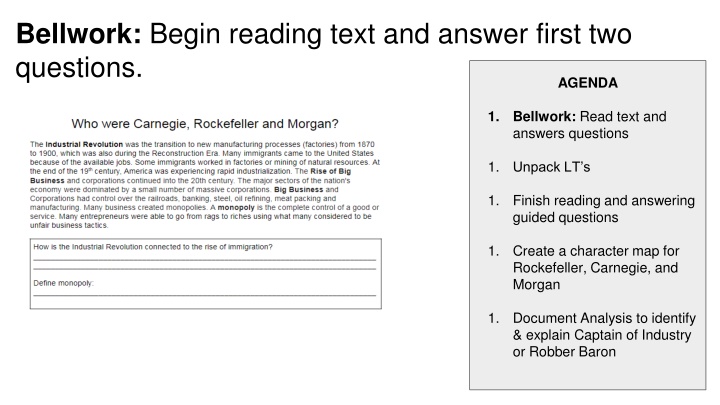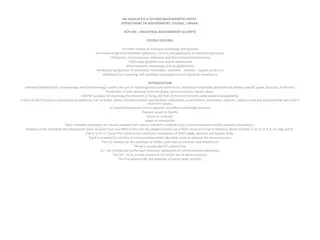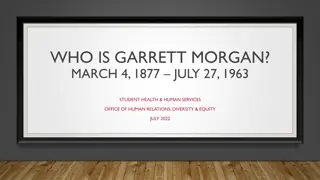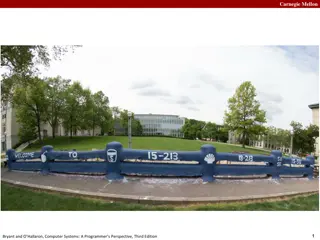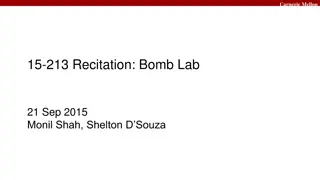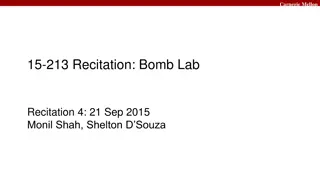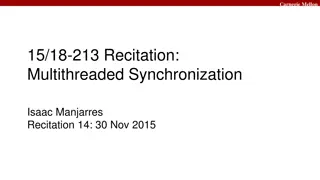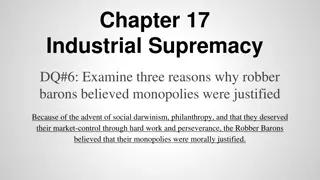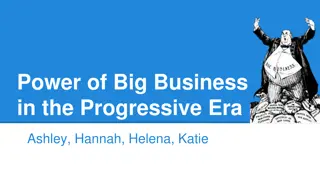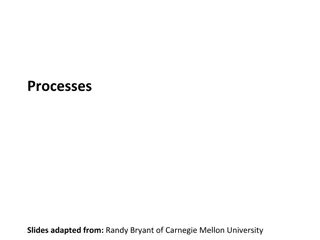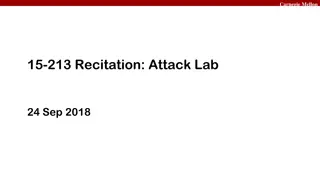Industrial Titans: Carnegie, Rockefeller, and Morgan
Explore the lives and legacies of business tycoons Andrew Carnegie, John D. Rockefeller, and J.P. Morgan during the U.S. industrialization era. Understand their influence on industries such as oil, steel, and finance, and analyze their impact on laborers and corporate structures. Dive into the debate of whether these individuals were Captains of Industry or Robber Barons through document analysis and character mapping.
Download Presentation

Please find below an Image/Link to download the presentation.
The content on the website is provided AS IS for your information and personal use only. It may not be sold, licensed, or shared on other websites without obtaining consent from the author.If you encounter any issues during the download, it is possible that the publisher has removed the file from their server.
You are allowed to download the files provided on this website for personal or commercial use, subject to the condition that they are used lawfully. All files are the property of their respective owners.
The content on the website is provided AS IS for your information and personal use only. It may not be sold, licensed, or shared on other websites without obtaining consent from the author.
E N D
Presentation Transcript
Bellwork: Begin reading text and answer first two questions. AGENDA Bellwork: Read text and answers questions 1. 1. Unpack LT s 1. Finish reading and answering guided questions 1. Create a character map for Rockefeller, Carnegie, and Morgan 1. Document Analysis to identify & explain Captain of Industry or Robber Baron
Learning Target: I can analyze documents to identify and explain the characteristics of a Captain of Industry or Robber Baron during U.S industrialization. Language Target: I can write the characteristics of a Captain of Industry or Robber Baron using academic vocabulary from the text
Three Business Tycoons John D Rockefeller (Oil) J.P. Morgan (Banker) Andrew Carnegie (Steel) Purchased Homestead Steel works in 1883 and turned it into Carnegie Steel Corporation in Pittsburgh Pennsylvania in 1892 Formed the Standard Oil Trust in 1863 and transformed it into Standard Oil Company in 1870, Cleveland Ohio Reorganized troubled business structures,dominated corporate financing Laborers were immigrants, African Americans, women, and children 10-12 hour work days x 6 days a week Very low wages Accidents in the workplace occured due to unsafe working conditions (sometimes death)
You must add FOUR details to each of the character maps!
Directions 1. Fully Read and Analyze each document. 1. Decide whether the document represents a Captain of Industry or a Robber Baron by placing an X in the box. 1. Defend your choice with a minimum of 3 sentences that explains how it represents either a Captain of Industry or a Robber Baron
Document 2 Our primary social adjustment is a denial of justice. In allowing one man to own the land on which and from which other men must live, we have made them his bondsmen in a degree which increases as material progress goes on. This is the subtle alchemy (transformation that may not be obvious) that in ways they do not realize isextracting from the masses in every civilized country the fruits of their weary toil; that is instituting a harder and more hopeless slavery in place of that which has been destroyed; that is bringing political despotism (Absolutism) out of political freedom (Democracy), and must soon transmute (change) democratic institutions into anarchy (chaos/rebellion). It is this that turns the blessings of material progress into a curse. It is this that crowds human beings into noisome cellars (disgusting basements) and squalid (unsanitary/unsafe) tenement houses. Source: Henry George, Progress and Poverty (1879) EXCERPT
Document 3 "Meanwhile, without being in the smallest degree checked by the clamor against it, theabsorption of business by ever larger monopolies continued. In the United States there was not,after the beginning of the last quarter of the century, any opportunity whatever for individual enterprisein any important field of industry, unless backed by great capital. During the last decade of the century, such small businesses as still remained were fast-failing survivals of a past epoch. .. . The railroads had gone on combining till a few great syndicates controlled every rail in the land.In manufactories, every important staple was controlled by a syndicate. These syndicates, pools, trusts, or whatever their name,fixed prices and crushed all competition except when combinations as vast as themselves arose. Then a struggle, resulting in still greater consolidation, ensued. The movement toward the conduct of business by larger and larger aggregations of capital, the tendency toward monopolies, which had been so desperately and vainly resisted, was recognized at last, in its true significance, as a process which only needed to complete its logical evolution to open a golden future to humanity. "Early in the last century the evolution was completed by the final consolidation of the entire capital of the nation. The industry and commerce of the country, ceasing to be conducted by a set of irresponsible corporations and syndicates of private persons at their caprice and for their profit, were entrusted to a single syndicate representing the people, to be conducted in the common interest for the common profit. The nation, that is to say, organized as the one great business corporation in which all other corporations were absorbed. . " Source: Edward Bellamy, from Looking Backward (1888) EXCERPTS In this context, a syndicate (group of people),or trust refers to the buy out of any competition (smaller companies)
Closure Think Pair Share What if you were told you could become a wealthy business owner here in Rochester and as a result you would become extremely rich---but to do so you would have to be a Robber Baron using ruthless business tactics. Would you take the opportunity or deny it? Explain
